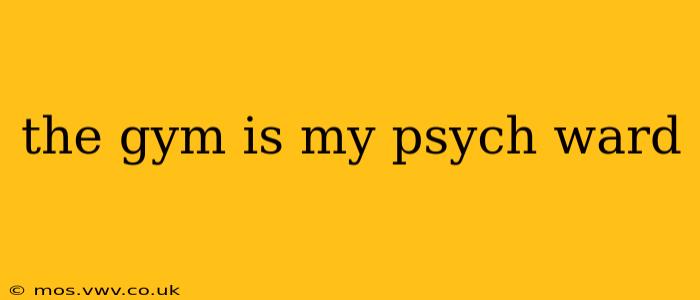For many, the gym is a place of physical exertion, muscle building, and achieving fitness goals. But for some, like myself, the gym transcends its typical function; it’s become my unexpected sanctuary, a place where I find solace and manage my mental health. This isn't about replacing professional help – it's about supplementing it with a powerful tool for self-care. The gym has become my unconventional psych ward, a space where I can process emotions, build resilience, and cultivate a healthier mindset.
Why the Gym Feels Like Therapy?
The connection between physical and mental health is undeniable. For me, the gym provides a unique blend of therapeutic benefits that traditional therapy sessions sometimes lack. The rhythmic repetition of exercises, the focus required for proper form, and the tangible results I see in my physique create a sense of accomplishment and control that positively impacts my mental state.
This isn't about seeking validation through aesthetics; it's about the process. The discipline needed to consistently show up, push through discomfort, and celebrate small victories builds self-esteem and resilience – qualities vital in managing mental health challenges.
Does Exercise Really Help with Mental Health?
This isn't a novel idea. Numerous studies confirm the positive impact of exercise on mental wellbeing. Physical activity triggers the release of endorphins, natural mood boosters that alleviate stress, anxiety, and depression. The gym provides a structured environment to facilitate this process.
How Does Exercise Alleviate Symptoms of Depression and Anxiety?
Regular exercise has been shown to reduce symptoms of depression and anxiety by:
- Reducing stress hormones: Exercise helps regulate cortisol levels, the hormone associated with stress.
- Improving sleep: Physical activity promotes better sleep quality, crucial for mental health.
- Boosting self-esteem: Achieving fitness goals, no matter how small, builds confidence and a sense of accomplishment.
- Providing a distraction: The focused effort required during workouts provides a welcome distraction from negative thoughts.
- Creating a sense of community: Many find support and camaraderie in gym environments.
What if I Don't Like the Gym? Are There Alternatives?
Finding an activity you enjoy is key. The gym isn't the only path. Alternatives include:
- Yoga: Combines physical postures, breathing techniques, and meditation.
- Hiking: Offers a connection with nature and provides a good cardiovascular workout.
- Dancing: Fun and expressive, promoting both physical and emotional release.
- Team sports: Provides social interaction and a sense of belonging.
Is the Gym a Replacement for Therapy?
Absolutely not. The gym serves as a valuable supplement to professional mental healthcare, not a replacement. If you are struggling with your mental health, seeking help from a qualified therapist or psychiatrist is crucial. The gym can be a powerful tool in your overall wellness strategy, but it shouldn't be the sole method of managing mental health conditions.
Can the Gym Worsen Mental Health?
While generally beneficial, the gym can negatively affect mental health under certain circumstances. Excessive exercise or focusing solely on physical appearance can lead to body dysmorphia, eating disorders, and other issues. It's crucial to maintain a healthy balance and prioritize overall well-being, not just physical fitness.
How Can I Use the Gym Effectively for Mental Wellness?
- Set realistic goals: Start small and gradually increase intensity.
- Focus on progress, not perfection: Celebrate small victories.
- Listen to your body: Rest when needed and avoid pushing yourself too hard.
- Find an activity you enjoy: This will make it more sustainable.
- Consider working with a personal trainer: They can help you create a safe and effective workout plan.
The gym is more than just iron and treadmills for me; it’s a place of self-discovery, resilience, and mental wellness. It's a crucial part of my self-care routine, complementing professional help to build a healthier, happier me. Remember that your mental health journey is unique, and finding what works best for you is key. This is my experience; yours may differ, but the core message remains: prioritizing physical and mental wellbeing is essential for a fulfilling life.
